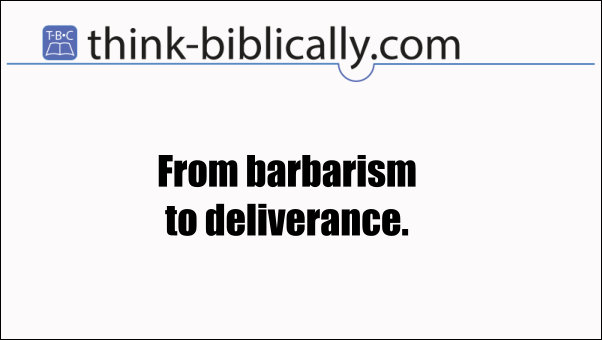By Tyson Thorne

Back in October of 2002, Westword, a newspaper out of Boulder, Colorado. published a full front page story on B.C. Tours (a company my friends and I started). The reporter, David Holthouse, interviewed each of us separately. During our interview he asked me a surprising and off-topic question: how do you justify God commanding the Israelites to kill everyone in the Promised Land? This is a question I've been asked before, so I had an answer, albeit a brief one, at the ready. Surprisingly, this exchange made it into the article.
"God told the Israelites when they moved into the land to wipe out everybody, to spare no one, not even their cattle. Why did he do that? I don't know. That's God's call. In that case, genocide was obviously the right thing to do because God commanded it. I'm not willing to set it aside and say that part of the Bible is patently untrue because a loving God would never do that. I don't presume to lecture God."
We touched on this topic yesterday when we covered the discovery of the ancient city Ai. In Joshua 6 we witness Israel's obedience to God's command in taking the city of Jericho:
"They annihilated with the sword everything that breathed in the city, including men and women, young and old, as well as cattle, sheep, and donkeys."
And there it is. It is not the only place Israel was instructed to kill everything but it is the most succinct description of the people acting as God's judgment on the nations.
I later discovered that my quote had made it into a speech given by someone in Europe, a transcript of which was online. The speaker didn't mention me in a flattering way, in fact he said my answer "scared" him. I wasn't offended, rather it opened my eyes to the way most people deal with the topic. When people come to such passages in Scripture they aren't wondering "what gives God the right to do this", they are wondering why, and how, God could do such a thing. They see God as a monster. But the God who ordered such mass destruction is also the God that died on a cross for our sins. They are one and the same. How do we reconcile this?
In my graduate studies we examined different methods for understanding God's actions through history. One such method is dispensationalism, a theory that God works differently through different periods of history. I consider myself a bad dispensationalist, bad because I see only two breaks in God's apparent strategy (most identify seven). There is, however, another way to understand God's action's: Canonical Criticism. This method tries to understand the Bible in its completeness rather than as a series of independent books and stories. There is merit in this approach, and I think it helps us understand these kinds of troubling passages.
The ancient world was a violent place. The surrounding nations often carried out such attacks against their worst (and weakest) enemies. The killing of all the men and the selling of women and children into slavery while looting the towns was the modus operandi. God instructed his people not to plunder these cities for two reasons, the first is that this war was not something to profit from, and second, the people of the land were so corrupt that keeping anything from their cultures would cause sin and suffering to the fledgling nation for centuries to come. Unfortunately Israel did not obey God completely and they later fell into the same kind of sin as the people they were commanded to eradicate. Psalm 106.37-38 describes the sins of the land:
They sacrificed their sons and daughters to demons.
They shed innocent blood –
the blood of their sons and daughters,
whom they sacrificed to the idols of Canaan.
The land was polluted by bloodshed.
As mentioned before, the ancient world was a violent place.
When we look at the Bible as one story, we see that God's chosen people were taken from a life of slavery to one of freedom. They were placed on a path to sanctification; God had to move them -- and the world -- from barbarism. We witness throughout the Old Testament a people who at times faithfully followed the path and sometimes failed miserably. God was patient, however, as he led them to deliverance, as he led them to Jesus. Since then God's plan has unfolded so successfully that we today no longer accept the evils and atrocities of the past. Today such events appear unthinkable, and that is a good thing. We may not like the necessary steps God took to get us here, but those steps brought humanity out of the darkest place it's ever been.
Why did God command the slaughter of so many people? So that the generations that followed might know peace instead of violence, goodness instead of evil, salvation instead of judgment. This is one of the greatest lessons of the Bible, God's deliverance of humanity, and there were dark times on the path to get us there. These episodes of Israel taking the land were dark times indeed, but none were darker than when the Son of God gave his life to afford every person the opportunity to know God and to be with him eternally.When we reject God and his efforts, we become a part of the dark evils of history. Be the light God has called you to be.